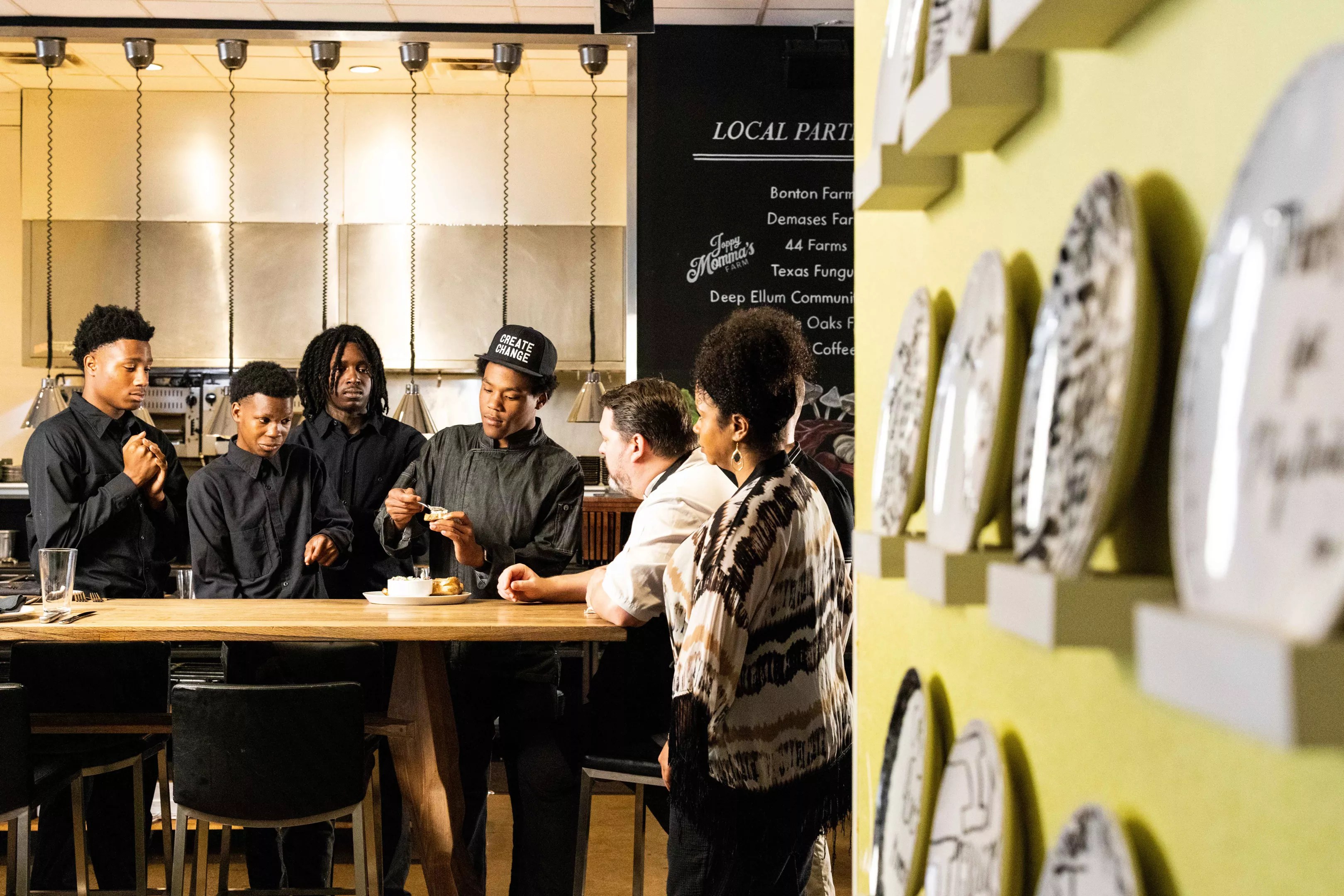
Kathy Tran

Audio By Carbonatix
A couple of years ago, things weren’t looking great for Carlos. The Dallas teen was “involved” with the justice system and had a hard time controlling his temper.
Carlos, now 18, joined Café Momentum’s yearlong paid internship program about a month ago. The program offers training, education and services to young men and women who have been arrested or detained in the juvenile justice system. It offers access to a full educational curriculum providing paths to high-school graduation, along with workforce development, 24/7 case management and mental-health services. Each year the organization works with 60 to 80 young men and women.
Early on, Carlos worked as a server at the upscale downtown restaurant, but now he mostly prefers back-of-the-house work, where he works with Kenneth, one of the staff members at Café Momentum.
“I’m back there with somebody that’s older, and he shows me what to do and we just chill and talk. We might just listen to music, but yeah, I’d rather be back there,” Carlos says with a little laugh.
The internship has taught Carlos patience. He says he’s learned that as long as you have patience with people, they’ll calm down. And while he might not see himself in the restaurant industry over the long run (he’d like to learn to be a barber and eventually own his own shop), being here now is important to him.
“Everyone here is respectful,” Carlos says, talking about both staff and customers. “It kind of teaches me how to be more respectful. They’re respecting me already. It makes me want to be respectful.”
Carlos says the leadership team at Cafe Momentum values him. It’s palpable.
“They’re not so worried about money. I feel like they want to see us. They’re nice, and they care about you,” he says.
Last week, Carlos graduated from high school, something until recently he thought he wouldn’t be able to do. The Cafe Momentum staff hired a photographer to go take photos of Carlos in his cap and gown – just like anyone would for any other kid.
••••
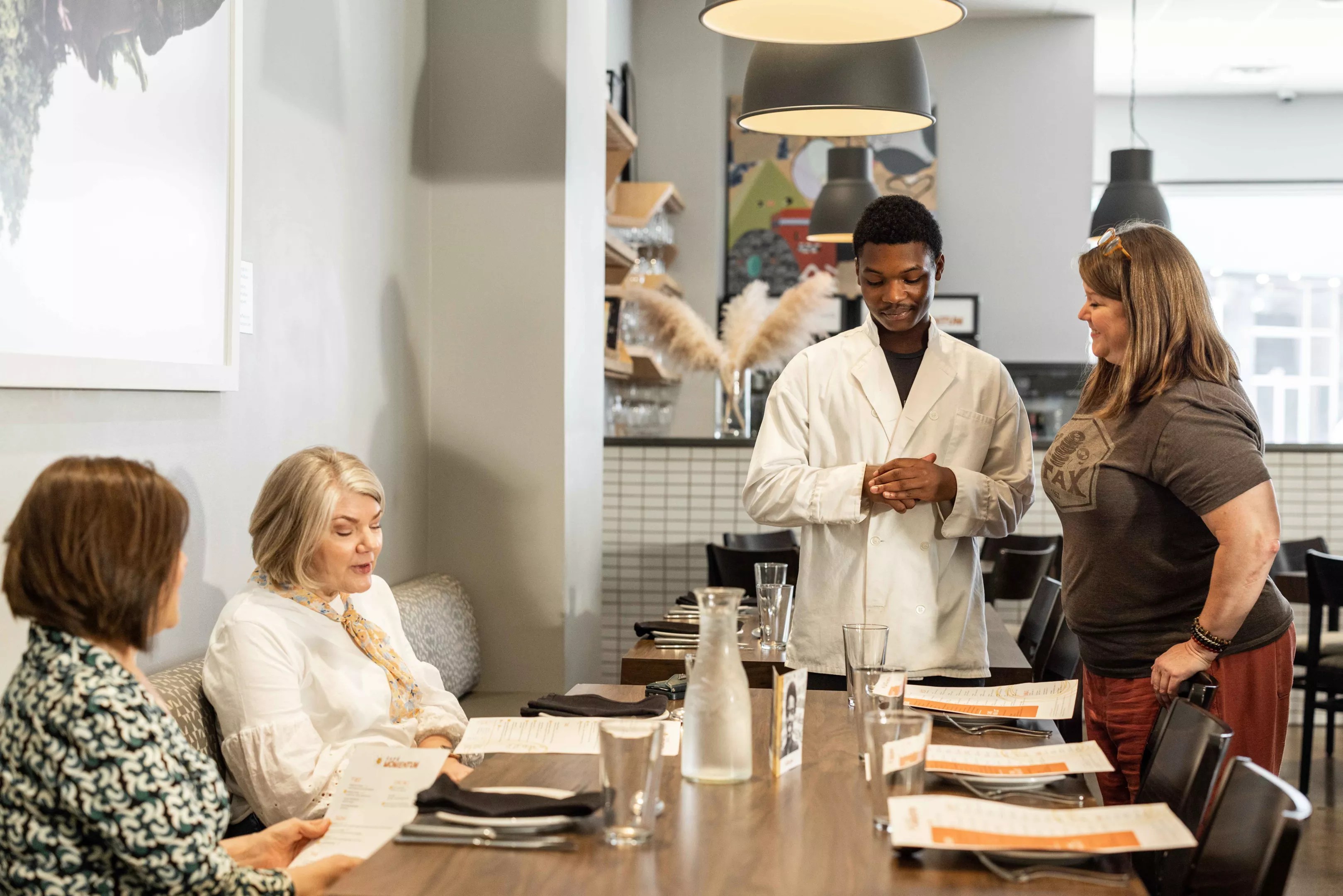
Intern Wiley speaks with Café Momentum guests at a Friday night dinner.
Kathy Tran
Such wins in the juvenile justice system are hard-fought and rare, but Café Momentum’s model is resoundingly working. Recently, founder Chad Houser was recognized with an award by the National Council of Juvenile and Family Court Judges (NCJFCJ) for his success in breaking the cycle of incarceration and violence for young people in the juvenile justice system. Two more locations of Café Momentum have opened this year, with a goal of 10 markets over the next five years and 50 markets in 25 years.
Not being taken into custody again isn’t a win for the program’s interns – it’s the expectation. But how did Houser, a kid who grew up splitting time between Allen and Pleasant Grove and went on to become a chef, create a successful juvenile justice program? His journey down that road started years before he was born.
Houser’s mom, Cindy Nelson, graduated from W.W. Samuell High School in Pleasant Grove in 1973. She was a freshman when the high school began to integrate.
“As they began to bus Black students into Samuell, that area of Pleasant Grove began to experience white flight,” Houser recalls. “But my grandparents didn’t leave. They stayed in Pleasant Grove.”
Houser, who was born in 1975, grew up spending weekends at his grandparents’ house. While his mom and grandmother sewed, he ran around in his grandfather’s garden.
“It also meant I was running around and playing with kids in the neighborhood who were predominantly Black. It also meant that I would see the effects of institutional racism or systemic racism, inequitable wages and so forth,” he says.
It wasn’t uncommon for his grandfather to hook up a hose to the kitchen sink and run warm water through a window, over the fence and into the neighbor’s backyard to fill up a kiddie pool because the neighbor couldn’t pay the water bill that month. That’s also how the two kids next door were able to bathe at times.
Houser and his mom lived in Allen, north of Plano, which was then a small but growing suburb. “It was very white, very middle class, so I lived in these two different worlds,” Houser says. “They weren’t the same.”

Café Momentum interns Emanuel (left) and Erin are making a difference at the restaurant and in their lives.
Kathy Tran
Fast-forward to 2007. Houser took out a loan and sold his house to buy the upscale restaurant Parigi’s in Uptown. One day in 2008, he was invited to help teach eight young men in juvenile detention how to make ice cream.
“And the moment I met those eight young men, I was ashamed because I realized I had stereotyped them and labeled them before I’d ever met them. And I was wrong. And I think the cause of that shame was that I knew better,” Houser says.
“I was raised better. I saw. I knew. But I still defaulted. I was ashamed enough to be humbled. And I was humbled enough to listen.”
And listen he did. Those eight young men told him exactly “who they were, how they were and why they were,” Houser recalls. Two days after that initial meeting, the group competed against culinary college students in an ice cream-making contest and one of them won the whole competition.
“He’s so excited, and at first he said to me, ‘I just love to make food and give it to people and put a smile on their face.’ I don’t think I’ve ever heard a human being describe their heart more beautifully. He said when he got out he was going to get a job in a restaurant and asked me if he should work at Wendy’s or Chili’s.”
Driving home that evening, Houser went from being proud, inspired and motivated to sad, angry and frustrated. He realized that the young men were going back to all of the same things that led them to where they were.
“Nothing changes. He doesn’t go back to resources all of a sudden, right?” Houser says. “He doesn’t go back to a therapist and food in the fridge and transportation access and all of these things.”
He started to think about his own life at 16 years old versus the young man who won the competition. It was the first time that Houser saw what privilege was and how it manifests. He realized quickly that while the main difference between him and them at 16 was skin color, it was also their socioeconomic class, the part of town they were born in, resources, education and healthcare.
“It was the idea that at 16 years old, I was given every opportunity over and over and over again to succeed, and then every opportunity to fail and get up and try again. And that wasn’t the world that he lived in,” he says.
Houser had a choice. Just keep moving forward and going about his life in relative comfort at his upscale restaurant, or sell it all and start something new.
••••
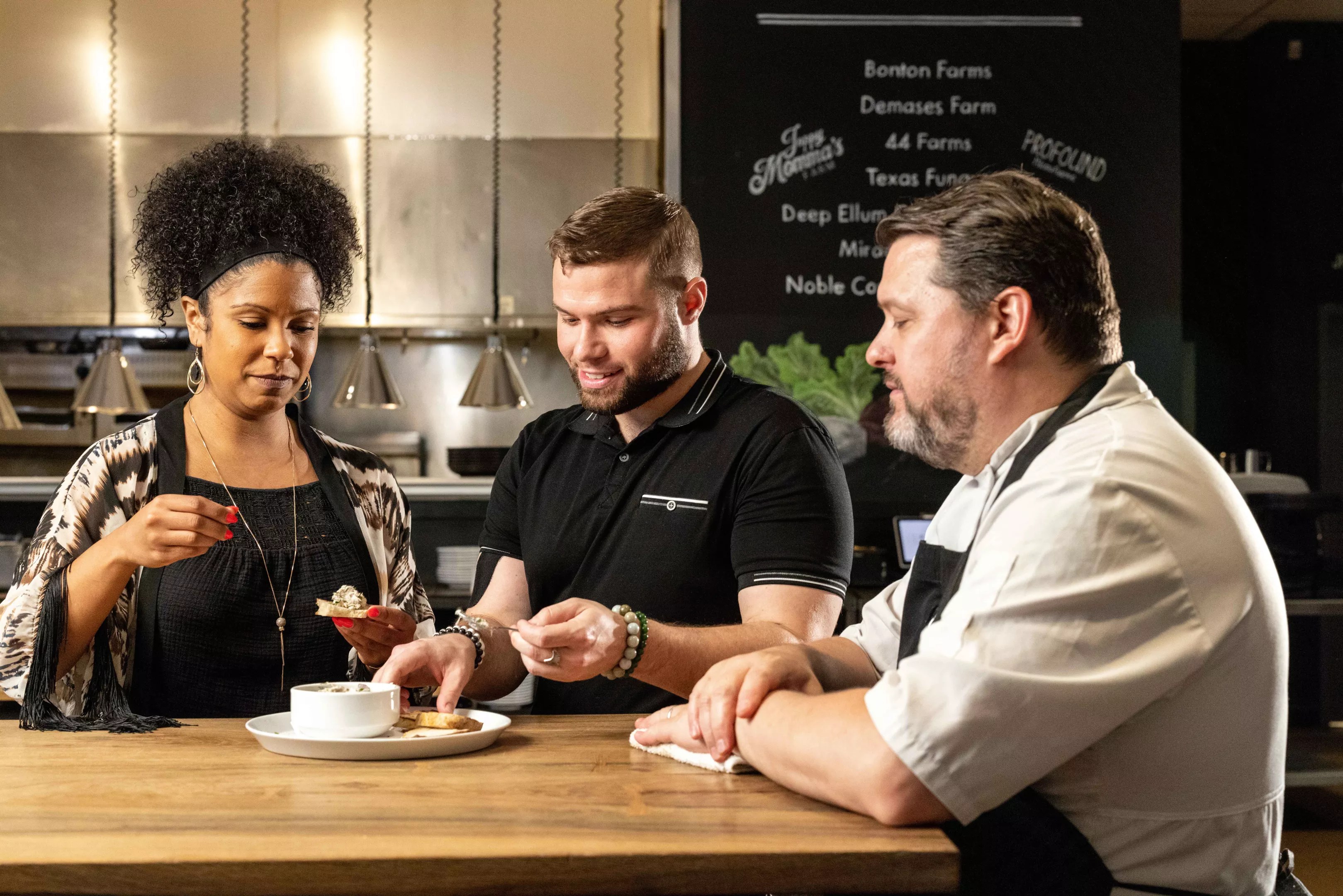
Restaurant program manager Tyreesh Browning, service training manager Conner Boyett, and chef Aaron Collins discuss a white fish dish.
Kathy Tran
More than 60,000 juveniles sit in jails on any given day in the U.S. according to the American Civil Liberties Union. Each year in Texas more than 50,000 youth are arrested or referred to probation. According to a 2021 Dallas County annual report, 1,434 Dallas youths were admitted to a Dallas County Juvenile Department detention center.
The Hogg Foundation at The University of Texas reports that recidivism rates for young people are as high as 75% within three years after confinement at a juvenile justice facility.
The most common offenses are low-level. In Texas, 59% of juvenile arrests are for nonviolent offenses like larceny, motor vehicle theft, running away from home, alcohol and drug violations, curfew violations and loitering. Fewer than 6% of juvenile arrests in Texas are for serious offenses like aggravated assault, robbery, rape or murder.
Houser founded Café Momentum in 2015 and it has since been lauded as one of the best restaurants in the city. But it primarily serves as a nonprofit that has, to date, helped more than 1,200 “justice-involved” young people. The team at Café Momentum works in tandem with juvenile justice officials and other community partners.
While restaurant staff teaches them how to work in a kitchen, case managers address urgent basic needs and work through issues like anger management, trauma recovery, fatherlessness and abandonment. A community service center extends the nonprofit’s reach beyond the restaurant: It’s a safe place for interns to study, connect with others and recharge. Volunteers help with tutoring, and they provide life-skills workshops.
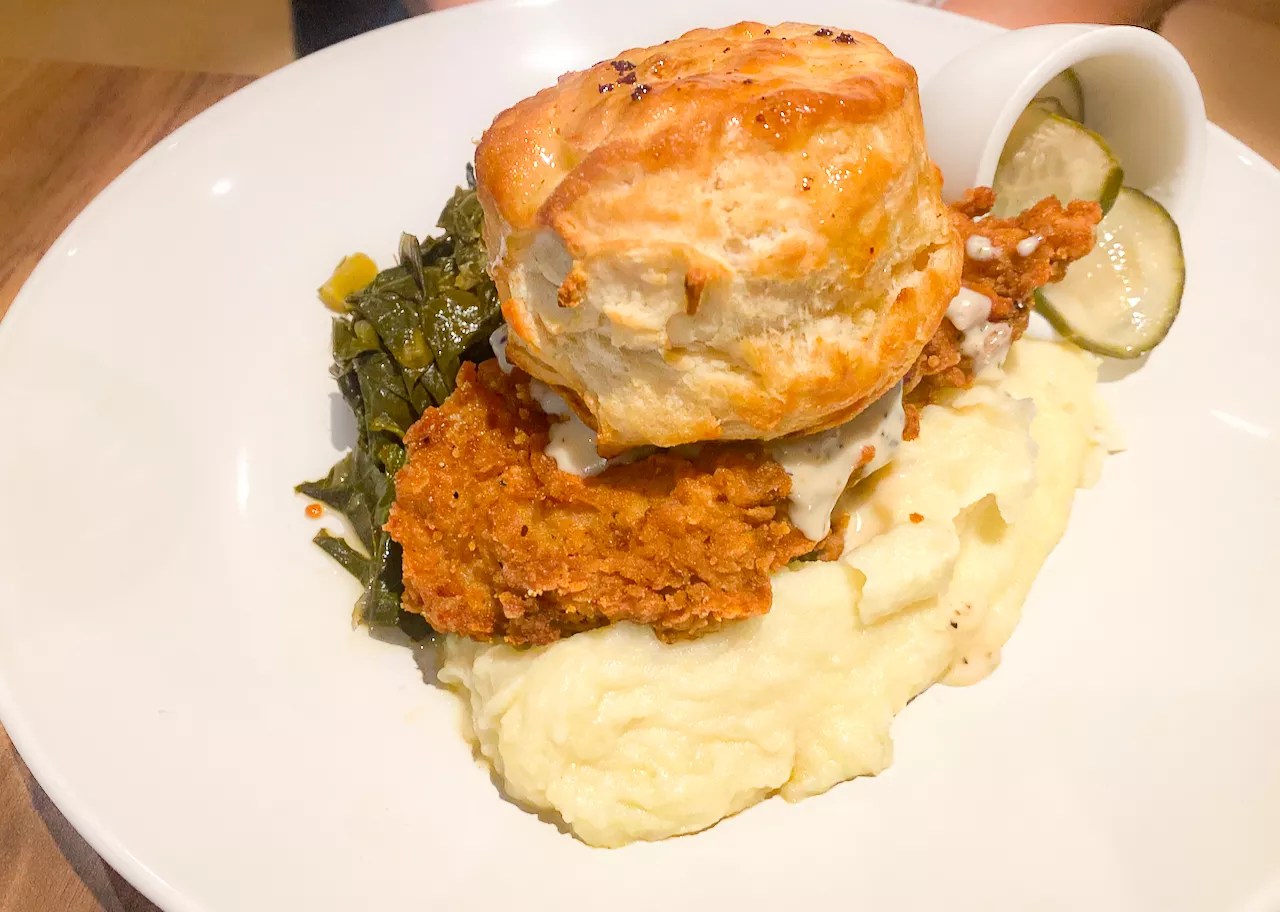
Smoky fried chicken over mashed potatoes and fresh biscuit at Café Momentum.
Lauren Drewes Daniels
At the restaurant, interns run both the front and back of the house, but the adults in the room always keep a close eye on everything. Last names aren’t used and questions about pasts are discouraged. An intern’s past is closely protected, and the goal is to be always looking forward.
The service and food at Cafe Momentum lean toward fine dining, but the vibe is more like a communal kitchen. Hand-painted plates decorated by interns line a bright green wall. The thick mac and cheese might be some of the best in the city. Most diners start with a basketful of fresh baked bread. The menu is Southern comfort dishes like smoked fried chicken served over a mound of mashed potatoes with a homemade biscuit atop it like a crown. Fresh greens are cooked to a magical sweet spot; neither under- nor overdone. There’s no sacrifice here in terms of eating out and doing good.
The Stand Together Foundation is a philanthropic community that invests in other nonprofits that deal with major societal problems. Stand Together infused $1.9 million into Café Momentum, allowing Houser and his team in 2020 to launch Momentum Advisory, a parent organization of Café Momentum with a goal of spreading this disruptive approach to juvenile justice systems across the country.
The new mission is to open restaurants based on the Dallas flagship in other cities. A Café Momentum in Pittsburgh opened March 1, and one in Nashville is set to open later this year. Next year it’s Atlanta, then Denver and Houston the following year. Baltimore and Boston are on the radar.
On its website, Stand Together shares the story of another intern at Cafe Momentum, Abillyon. On the morning of his probation hearing, he’d prepared a written plea and he was ready to deliver it to the judge. He’d been a part of the internship program at Café Momentum in Dallas, but had left and was back in court.
Abillyon had been a good kid in junior high, but after his grandfather died he started hanging out with a tough crowd. In high school, he stole cars and broke into homes.
That morning, he was expecting to see only his grandmother in the courtroom.
Abillyon didn’t need to read his statement. Houser was there that day, sitting next to Abillyon’s grandmother, to testify on his behalf. Houser told the judge he believed that instead of returning to a facility, Abillyon should be allowed to come back to Café Momentum (even though it is not technically a “diversion program”). He told the judge he could see the teen’s potential.
Abillyon was released that day. He eventually graduated from the internship program, got his high school diploma, has enrolled in college and is an ambassador for Café Momentum.
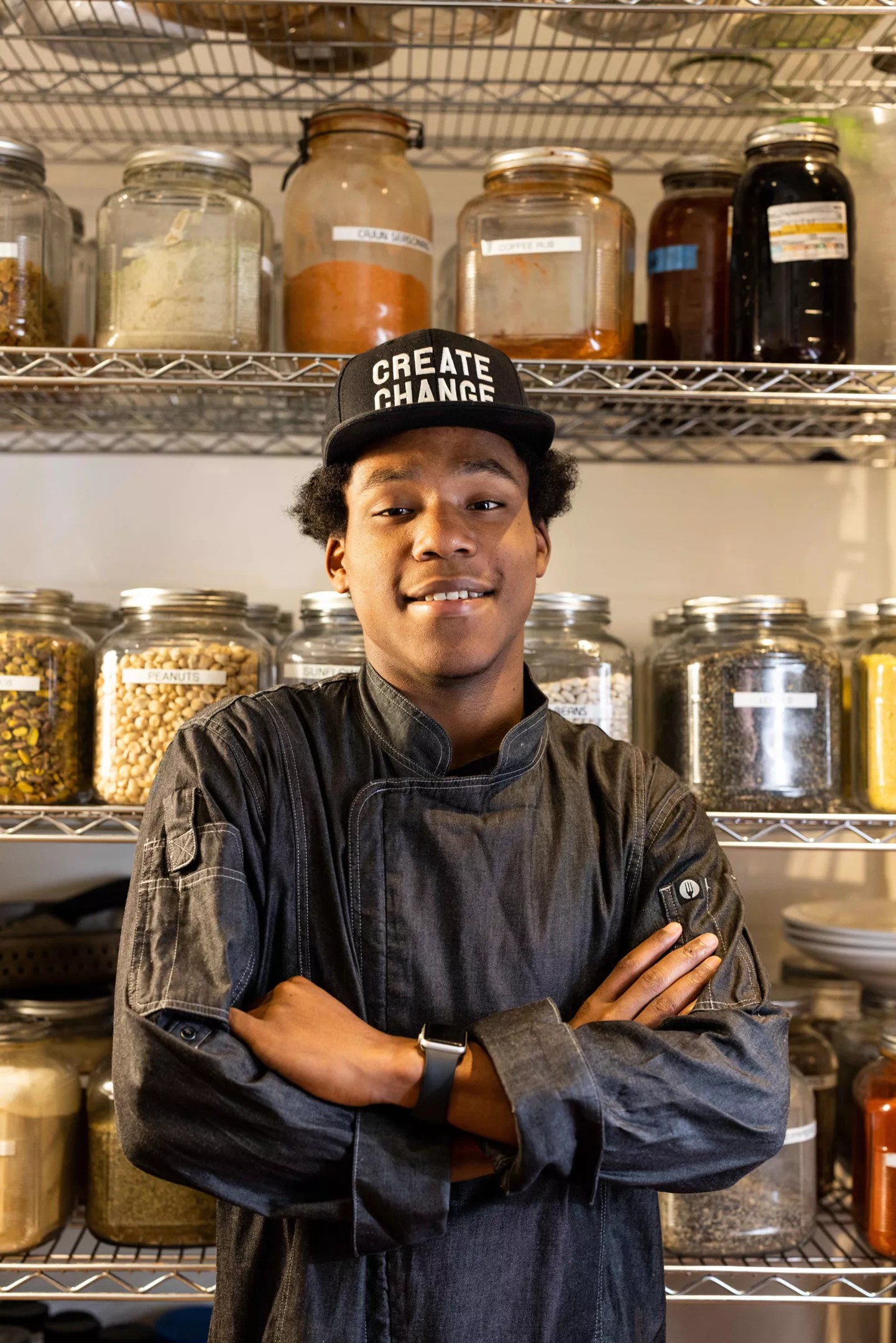
Brian feels his work—both physical and mental— at Café Momentum is paying off.
Kathy Tran
Brian is another current intern. He’s 17 and is wearing Houndstooth chef pants and a white snap-up chef’s shirt. He joined the internship program in 2021; he was out for a while but returned and is on schedule to graduate later this year.
“They’ve taught me a lot about my attitude,” Brian says matter-of-factly. “And to own up to my doings and what I have done. Mostly, they teach me how to be a great person when I leave this place.”
Brian, who is from Dallas, says these days he still has ups and downs, but he’s reacting to the downs differently.
“When me and the managers get into it and stuff like that – we’ve got our difficulties, we bump heads and stuff like that – they just tell me to own up to my doings,” he says.
Before service one evening, the restaurant is empty of customers as the staff and interns prep. The doors then swing wide open and two other interns slink in. There’s a round of applause. A manager rolling silverware into napkins jokes about them showing up. The young men are embarrassed and smile but quickly head to the back of the restaurant.
On another visit, as an intern is leaving for the evening, he makes his way to the front-of-house staff and tells them each goodnight, sometimes getting a hug along with a goodbye.
Brian sees his work here – owning it – paying off. When he gets frustrated he, like Carlos, talks to Kenneth while washing dishes in the back of the house. “He’s there for me. He helps me calm down, talks to me and asks me what’s wrong. Maybe he sits me outside so I calm down, so I can get back to work and just go on.”
The customers are important too. Brian says at first he was wary of talking to those who came to dine. A manager worked with him, demonstrating how to introduce himself and explain the program. (Every customer gets a quick rundown about the restaurant.) Brian learned to enjoy the interactions, and his confidence grew. Now he trains new interns on the process, explaining what they need to cover before telling them, “Just say it in your own words now.”
••••
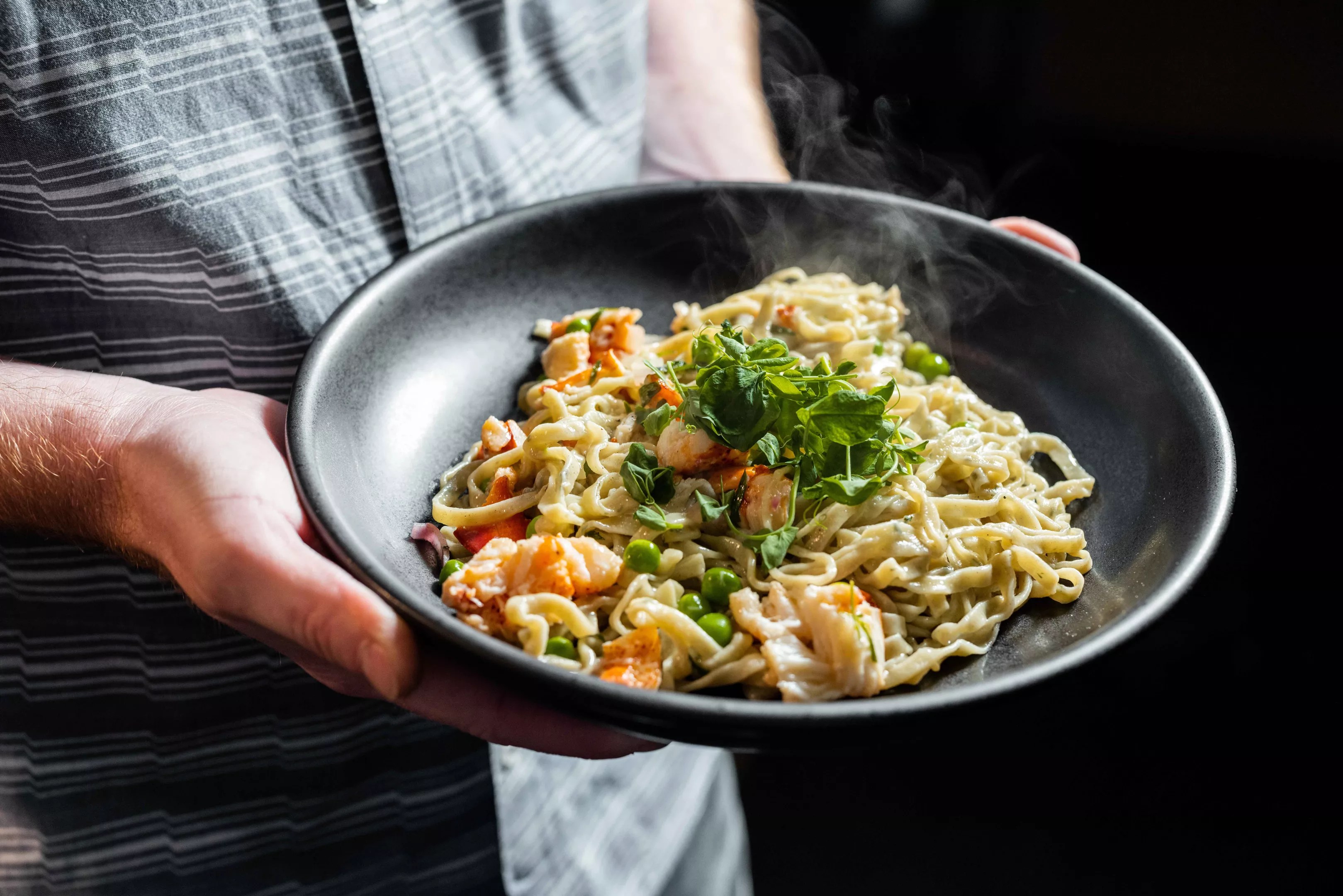
A lobster pasta dish at Café Momentum
Kathy Tran
Porshia Haymon, a clinical psychologist, has worked at Cafe Momentum for four years. She originally signed up to volunteer but was so impressed with the concept she quickly joined the staff and is the chief programs officer. She oversees all activities outside the restaurant.
Haymon’s goal is to make sure all the interns are prepared for life as if they’d never been involved in the justice system. That includes needs like acquiring identification, learning how to participate in a job interview or creating a résumé and applying for college. But she points to interactions with customers as an important aspect of the learning curve here.
“There’s so much to learn from simple exposure,” Haymon says. “Interns are exposed not only to different people and different experiences, but they’re exposed to different reactions from people.”
The success of the program is tangible in an arena where victories are hard-won.
“This is a win,” Haymon says. “This is a win because each and every one of these young people choose to come here. They’re not court-mandated. It’s a win that Carlos thought he wasn’t going to graduate and he did.”
Haymon says a mind shift is important in disrupting the trajectory: Not going back to jail is not a win. “That’s not the norm for my 15-year-old daughter, so why should it be for these kids?”
Haymon points to the small triumphs that bring the big wins together, like being able to go to a job interview and get the job. “It’s a win every time they see themselves being successful, regardless of how small that is,” she says.
There are big triumphs as well. All of the interns are enrolled in high school, have graduated or have earned their GED. More than 85% have completed or were in compliance with court orders. All have bank accounts, and 85% voluntarily receive counseling.
“They get a little glimpse. And then they get interaction with people that work here and people that eat here. They get respect. And then they’re like, ‘Oh, OK, I do have a place here,'” Haymon says.
Joey Orduña Hastings, CEO of NCJFCJ, says that once her organization had learned about the success of Café Momentum, giving Houser the award was non-negotiable. The group’s personnel work with nonprofits around the country, but the differentiator they see here is the licensed and talented professionals and their personal investment and visible dedication to the interns’ success.
Hastings points to Houser’s initial judgment of the eight young men and how he learned from that, how he was able to evolve his thinking. That, she says, is key in creating a successful program. Now, she receives calls from across the country from people who want to open a Café Momentum in their city.
Houser wants to continue the conversation about a new model for youth justice.
“What Dallas has proven,” Houser says, “is that taking the same young people that are entering a system that is not designed to support them, or to help them achieve their full potential in life, gets the same results over and over. We have built a different model that provides support, resources, opportunities, compassion, love and grace. And we’re getting very different results. And it’s not rocket science.”